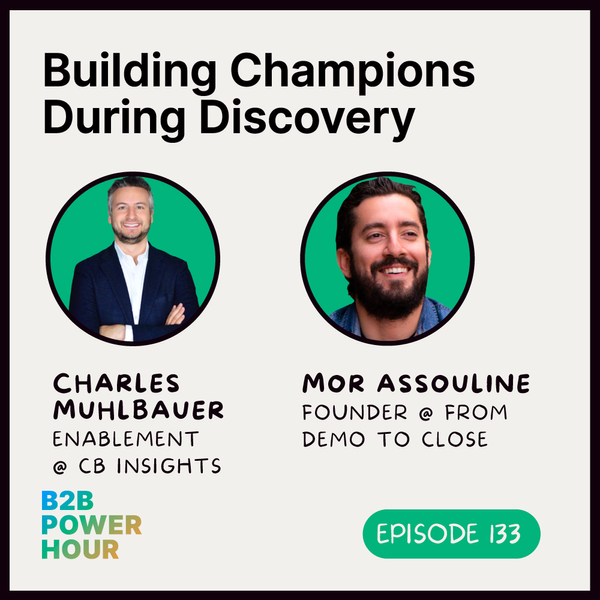Episode Summary
Discovery is one of the best places to find your champion.
Have you ever had sales calls drag on for months with no end in sight, only to finally realize the prospect you’re working with can’t push the deal through? We’ve been there.
That’s why we teamed up with Charles Muhlbauer, sales enablement manager at AlphaSense, and Mor Assouline, Founder of From Demo to Close, on an episode of the B2B Power Hour. They’re here to teach you how to find your champion during the discovery phase.
First, you’ll want to go in with proof — a lot of sellers forget to do this. Conduct about an hour of research, gathering just enough information to make you dangerous.
Then, make sure you know your “why.” Why are you setting up this call? What is the reason for this prospect to speak with you?
It’s best if you go into discovery assuming the prospect isn’t a right fit. Why? Because you’ll be prepared to overcome their objections. Plus, it takes the stress off both parties if you don’t feel pressured to make a sale or find a solution immediately.
Most prospects don’t want to tell you what their problems are. While it’s not your job to discover their problems on your own, it is up to you to raise issues so prospects can uncover them and build trust.
Don’t feel ready for your next discovery call? Don’t worry, this B2B Power Hour episode is packed with actionable insights. We go in-depth on the best ways to prepare for discovery, key characteristics all champions have, and how to transition to a new contact if you feel that your prospect won’t be your champion.
Plus, we review lists of questions you can use during your next discovery call to quickly find your champion.
B2B Power Plays
Top takeaways from this week’s conversation
👀 Learn how to spot a champion.
Most champions share similar characteristics. Here are the main signs to keep an eye out for during your discovery call to identify (or rule out) your next champion:
- Tonality: Does the prospect sound timid or confident? Are they answering your questions with confidence? If so, that’s one of the best signs they might be your champion.
- Vague responses: If a prospect can’t answer difficult questions or gives a vague response, they might not be able to push things further.
- Buy-in: Is what you’re saying resonating with the prospect? Do they mention how they’ve been talking to their team about this same problem recently? You might have yourself a champion.
✅ Start with the problem.
Discovery conversations don’t have to start with the prospect’s situation. Instead, start the conversation with their problem.
Discuss insights, issues, and what you’re hearing from other people before getting into situational questions.
3️⃣ You need three things to close a deal.
A successful deal meets the following criteria:
- The prospect has a problem.
- The prospect believes the problem is big enough that they actually want to solve it.
- They believe the impact is big enough for them to react.
If at any point, your prospect is missing one of these items, it’s probably best to move onto someone else on your outreach list.
Featured on the B2B Power Hour: Charles Muhlbauer
What he does: Charles is a sales enablement manager at AlphaSense, where he specializes in private capital market business development for emerging tech.
Key quote: “[Prospects] are not going to tell you what their problems are, so it’s part of our job to not necessarily uncover them, but to raise them on our own.”
Where to find him: LinkedIn
Featured on the B2B Power Hour: Mor Assouline
What he does: Mor is the founder of From Demo To Close, a sales training, coaching, and advisory program for AEs and founders at B2B SaaS Companies.
Key quote: “I think the goal of discovery is to find out, Does the prospect have a problem? Is it a real problem? How big is that problem? Who’s that problem impacting?”
Where to find him: LinkedIn | Demotoclose.com
Episode Highlights
Inflection points from the show
[0:55] Discovery prep: Conduct enough research to build your own point of view about the prospect’s company and pain points.
[5:31] Structuring your search: We go in-depth on how to structure your research for discovery calls. In essence, you need to know enough to start a thoughtful discussion.
[16:47] Always have proof: You and your prospect should always know why you’re talking to each other. A lot of sellers forget about bringing proof and knowledge to discovery calls.
[18:43] Identifying a champion: Champions exude confidence, answer questions directly and with honesty, and resonate with what you’re saying.
[24:16] The right mindset: Go into discovery with the mindset that the customer might not be the right fit. This makes it less salesy and takes away the pressure for both the seller and the prospect.
[32:25] Cold prospecting: Don’t treat cold prospecting like inbound leads. Ask what encouraged them to respond to your email, click on your ad, etc.
[33:54] Transitioning to a champion: Charles and Mor explain how they navigate the conversation when they realize the prospect they’ve been talking to isn’t capable of being a champion.
[42:19] Why deals stall: The two main reasons deals stall are objections and conditions. You can overcome an objection but not a condition.
Stay connected with the B2B Power Hour
⭐ Tune in for live shows and interviews that will help you learn what to test and try so you can sell (and market!) better to your customers and prospects.
🎧 Never miss an episode! Subscribe via Apple, Spotify, Google, or anywhere you listen to podcasts.
⚡ Join the 1Up Club to power up your prospecting. Buyers expect a different approach in 2023. Get access to power plays, special briefings, and even DIY enablement docs that help you prospect better.

